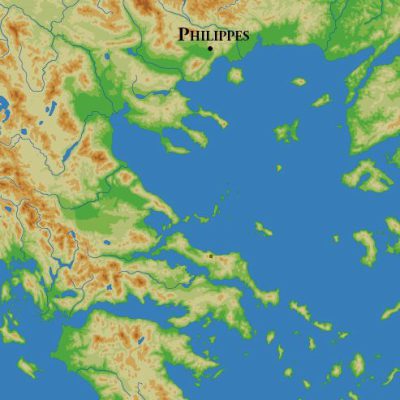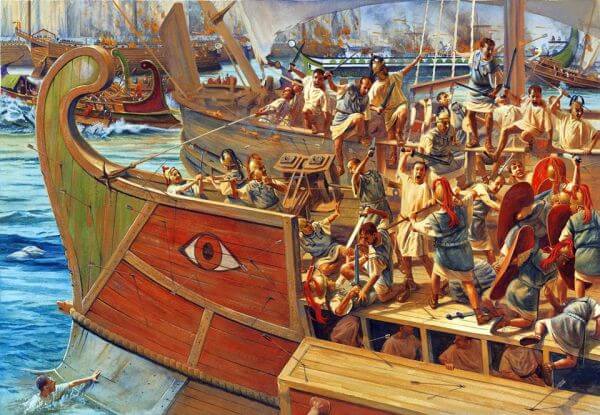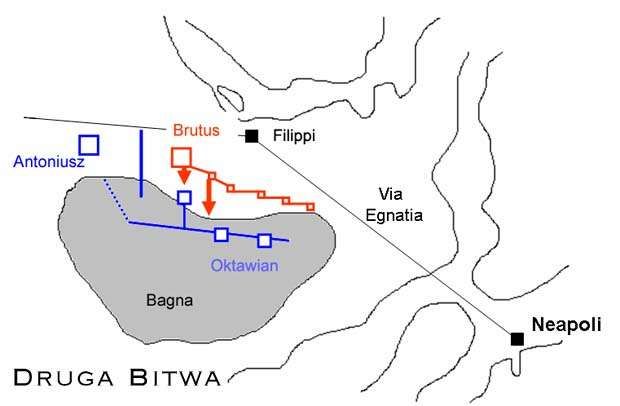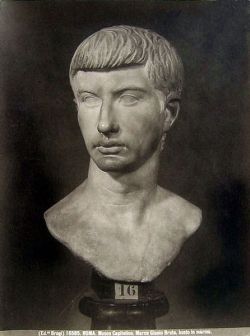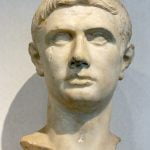Chapters
Battle of Philippi were actually two clashes in 42 BCE in eastern Macedonia, won by the combined forces of Mark Antony and Gaius Octavian, against Cassius Longinus and Marcus Brutus. The battle ended the lives of Caesar’s murderers and temporarily stabilized the situation in a country torn by civil war.
Background of events
The death of Caesar in 44 BCE divided the country of Rome. Republic supporters found themselves under the command of Cassius and Brutus and took control of the empire’s eastern lands. Opposing Caesar’s murderers were Octavian, Mark Antony, and Lepidus, who ruled the west.
The three last men joined their forces in 43 BCE, making the so-called II triumvirate. According to the treaty, Mark Antony was supposed to take the east as his fief, Africa to Lepidus, and the west to Octavian. And that was the problem. Brutus and Cassius controlled the east and were ready to resist and fight in defence of the republic. For this purpose, they gathered a mighty army in Macedonia, awaiting the attack of the enemy.
It’s worth mentioning the story (alleged by Plutarch), which happened to Brutus a few months before the battle. One night, a big dark creature manifested itself to Caesar’s murderer. On Brutus’ question: “What and whence art thou?” it answered: “Thy evil spirit, Brutus: I shall see thee at Philippi.” Brutus had a similar vision on the eve of the battle.
The situation, however, got worse because Octavian fainted during a journey to Greece. As a result, Antonius took command. On top of a great army, he marched on the camp of Cassius and Brutus, where the biggest battle of ancient times would take place.
In the summer 42 BCE, leaving Lepidus in Rome, he protects the business, Antonius and Octavian set out to Macedonia to the Philippi city. During the summer solstice, Mark Antonius sent from Italy eight legions commanded by Lucius Decidius Saxa and Gaius Norbanus Flaccus. Their purpose was to take control of passage settled east from the camp of Brutus and Cassius, disembedding them from aid and supply. On the second echelon, they managed to transport the main forces of Antonius and Octavian despite a huge enemy fleet.
Armies
Forces of Cassius and Brutus totalled 100.000 soldiers, the cavalry counted 17.000 riders. Together 17 legions.
Forces of Antonius and Octavian totalled 100.000 legionaries, the cavalry counted 19.000 riders. Together 19 legions.
Battle
First battle (3 October 42 BCE)
Right after arrival in Philippi in the middle of September Antonius, what surprised the enemy, set a camp in a disadvantageous place, on a dusty plain close to the position of republic supporters. Despite the advantage, Brutus and Cassius weren’t eager to fight. They believed that Triumvirates would run out of supplies, and they would retreat. Unexpectedly ill Octavian arrived in a litter, and he wasn’t able to battle.
Every day both sides positioned their armies trying to scare away each other. Meanwhile, Antonius’ soldiers were building a track among high reed leading through marshes to Optimates’ fortifications. When the way to the enemies’ camp was ready, Antonius sent a special unit to take some outposts. Brutus and Cassius didn’t see that coming. To stop Antonius’ forces, they began building a trench to cut off and flank the opposing armies. The idea was bright, but unexpectedly nine legions led by Antonius attacked Cassius’ fortification, and they had to change the plans. Antonius, like Caesar, believed in the military power of the Spanish legions. That’s why he confided them with the leading roles. On the right flank, he positioned ten legions and on the left four. The unexpected attack was an excellent idea, but Optimate didn’t pay attention to one issue: because of the attack, he exposed his left flank.
Soldiers of Antonius didn’t realize that they can be attacked from behind. The situation encouraged Brutus to attack. He let general Marcus Valerius Messalla Corvinus lead the strike, which caused massive casualties in Optimate’s forces. Brutus’ troops appeared in the opponent’s camp where they murdered everyone. Luckily 21-year-old Octavian had a hunch and left earlier.
Meanwhile, Antonius’ ten legions were cutting through Cassius’ lines. Finally, led by Antonius, they managed to reach Cassius’ camp. Ignoring the commander’s calling, opposing soldiers kept fleeing. Cassius retreated to a hill behind the fortifications. There he would order to kill him seeing Brutus being captured by Antonius’ legionaries. The capture wasn’t actual – Brutus has never failed in this battle.
Eventually, the battle ended on the third of October. Both armies lost their camps, but the casualties were relatively low. According to the traduction of Plutarch and Appian Octavian and Antonius appeared worse by losing 16.000 soldiers compared to 8.000 of Brutus. It could be considered a win for the republic all the more the aid (two legions) from Adriatic was stopped by the Republican fleet.
However, Brutus had bigger problems; he lost a valuable ally – Cassius. Also, he had to deal with the overzeal of his officers, who encouraged him to fight again. It appeared to be his final defeat.
Second battle (23 October 42 BCE)
The second battle took place nearly in the same location on the twenty-third of October. Brutus led a successful cavalry charge from the left flank. But the right flank entirely unwilling for fight gave way to Antonius’ strong army. His legions cut through and surrounded Brutus crushing his troops. Miraculously Brutus managed to escape with his most loyal men. However, he didn’t see any sense in fighting anymore and decided to take away his life.
Consequences
The battle of Philippi happened to be the end of the republic (however, we take its ending is considered to be in 27 BCE). The senate lost his influence in the government and became a purely representative institution. Principal rulers of the empire were now Triumvirates. However, three ambitious men couldn’t run one country.
Lepidus was the first to lose his influence. Deprived of his army in 36 BCE didn’t matter anymore in political fights. There were only two people left: Antonius and Octavian. A civil war was inevitable, which indeed outbreak in 33 BCE. Crucial settling between the leaders took place on the second of September in 31 BCE in the sea battle of Actium. Marcus Agrippa led forces of Octavian. Eventually, Agrippa won the fight despite the advantage of the enemy. Octavian sailed to Athens from where he was forced to set to Italy in 30 BCE to crush Antonius soldiers’ riots. Then he travelled to Alexandria.
Antonius and Cleopatra right after the battle fled to Alexandria, where they planned military actions. However, when Octavian’s armies arrived at Alexandria, and Antonius’ troops began to surrender, Cleopatra and Antonius committed suicide with no hope for escape.
As a result of the conflict, Octavian (who was later called Augustus) – young and talented leader got the power and influence. The year 27 BCE is considered the official end of the republic and the beginning of Principate.


